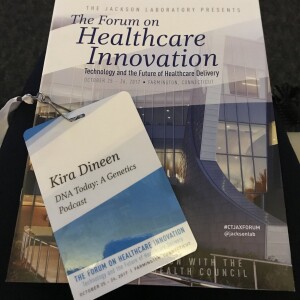
Thursday Oct 26, 2017
#69 Jackson Lab’s Forum on Healthcare Innovation
“The Forum on Healthcare Innovation: Technology and the Future of Healthcare Delivery” was hosted by Jackson Laboratories in Farmington, CT on the UCONN Health campus. The conference was full of healthcare professionals and covered genetic testing (including direct-to-consumer), genomics, the microbiome, patient advocacy and healthcare technology. In this episode, I share highlights from some of the presentations including from Francis Collins, the NIH Director. Francis Collins, Director of National Institute for Health, shares that the NIH also stands for hope. Reasons for hope include uncovering life’s foundations, translating discovery into health and moving forward together. Collins gave an overview of the different projects ongoing at NIH, starting with the backstory of the Human Genome Project. A major aspect of the project that has impacted the future of research and healthcare was the data sharing. Every 24 hours, new data collected from the day was uploaded allowing researchers to start using the data in their own research. It would have taken years if the project had waited to release data when it was officially published. This idea of data sharing has increased collaboration between scientist, accelerating the rate of research and development. Collins also shared his excitement around CRISPR, the gene editing technology. From basic research to human trials. This is huge as people often say basic research is not worth the money, but every once in awhile something like this comes along and completely changes the field. CRISPS has already achieved the status of a revolution in medicine and biotechnology. Collins predicts it will cure the first molecular disease, Sickle Cell Disease. The current major NIH project is “All of Us” (formerly Precision Medicine Initiative). Beta launched in May 2017 with a full launch in Spring 2018 where it will ramp up to having over 100 locations. The purpose of the project to accelerate healthcare, specifically for individualized care. Enrolling one million participants is the goal. The term participants is key, as opposed to human subjects, as the patients are considered partners in this journey. Why now? One main reason is the insane drop in the cost of sequencing, in 2004 it costs $22 million to sequence a genome, now in 2017 the cost is $800. “We don’t have a healthcare system, it’s a sickcare system” Collins explained. The more data we can provide showing prevention is more effective than treatment will help us make this transition in our health care approach. Collins also commented on the exciting new field of microbiome research, studying the bacteria that live in and on us. Human Microbiome Project’s mission is to generate resources for comprehensive characterization of the microbiome. It started in 2008 and is now in it’s second phase. George Weinstock, professor at Jackson Laboratories, state there are 754 studies on clincialtrails.gov (as of 10/25/17) that list the microbiome. New genetic sequencing technologies (like Next Generation Sequencing) has driven this field. Research centers around the relationship between disease and the microbiome. The microbiome has additional obstacles when researching, compared to genomics, due to it’s enormous plasticity. Our microbiome changes with our environment, diet etc. One interesting research study mentioned studies Olympic level athletes to find out if there is a “golden microbiome”, so far they have found a bacteria in common with many of these athletes, M. smithii. Another advancement in the field is an FDA approved product produced from microbiome research data, AEObiome’s MotherDirt. It is a body spray that is designed to be compatible with the microbiome of the skin. James Lu, Co-Founder and Senior Vice President of Applied Genomics, Helix, discussed direct to consumer genomics and a few interesting new genetic themed apps (Neanderthal by Insitome, BABYGlimpse by HumanCode). He also talked about emerging platform for participatory research such as Precise.ly, which tracks symptoms and diseases. Lisa Anderson, Co-Founder and Chief Executive Officer of Genome Medical, stressed the potential genetics/genomics medicine has to improve patient outcomes and reduce costs of care, YET it’s not accessible to patients despite the technology existing. Genetic testing is growing 20-25% yearly, however the workforce is only growing by 3%. This gap is continuously growing. Her company aims to reduce this gap by providing real time access to genetic counseling. Anderson also predicts within 5 years every cancer patient will have germline and somatic sequencing. Andrew Ury, Chief Executive Officer and Founder of ActX, explained how direct-to-consumer genetics can be used for a potential screening for drug compatibility (pharmacogenomics). 90% of patients have potential drug genomic interactions. This is especially useful for mental health medications. An announcement/reminder that the first Genetic Counseling Awareness day will be on November 9th. Follow activities with #IAmAGeneticCounselor and on National Society of Genetic Counselor’s website.
No comments yet. Be the first to say something!